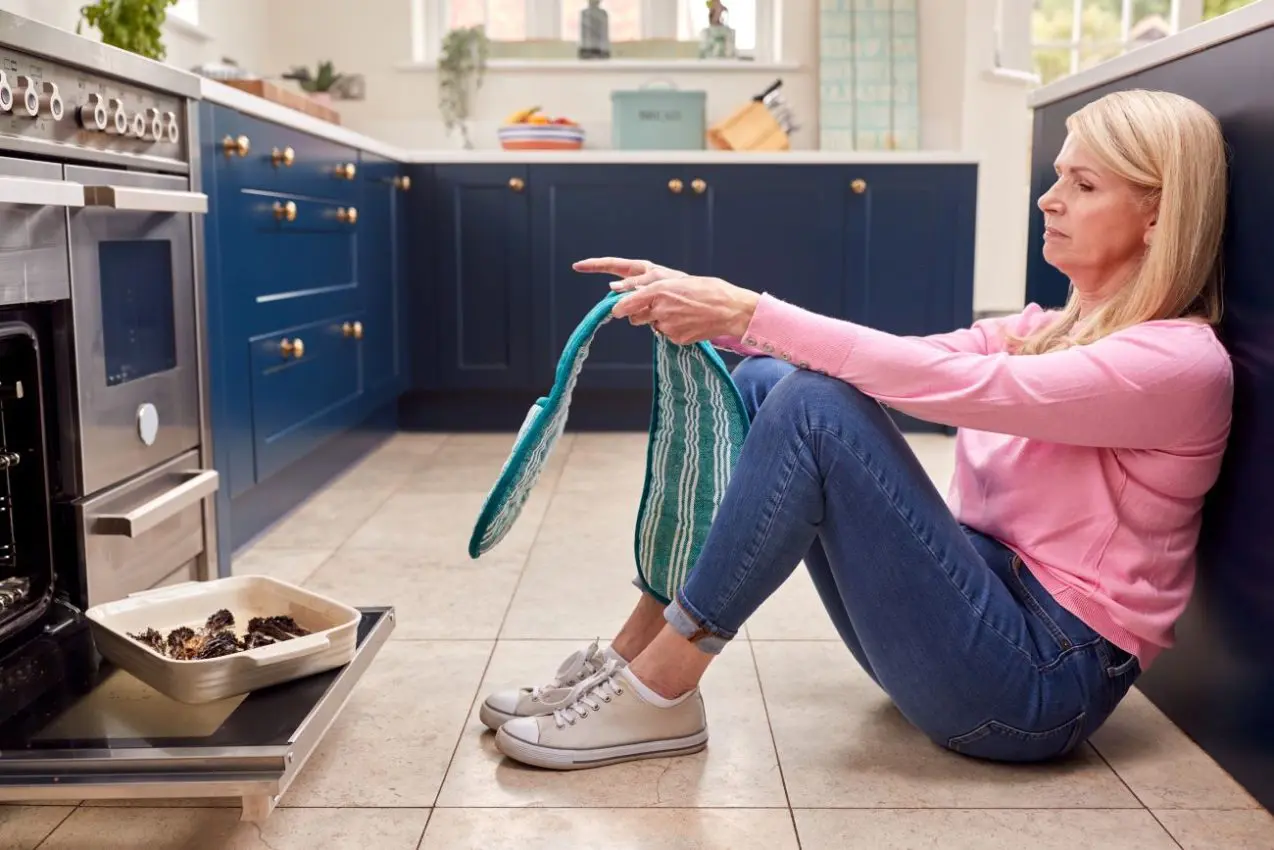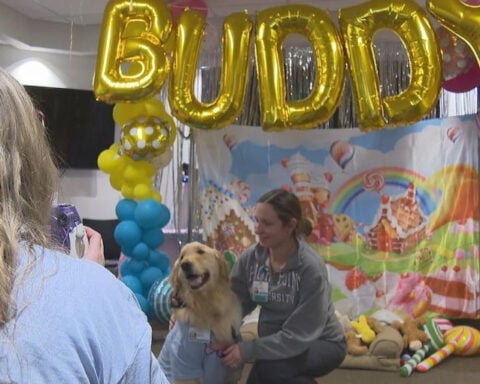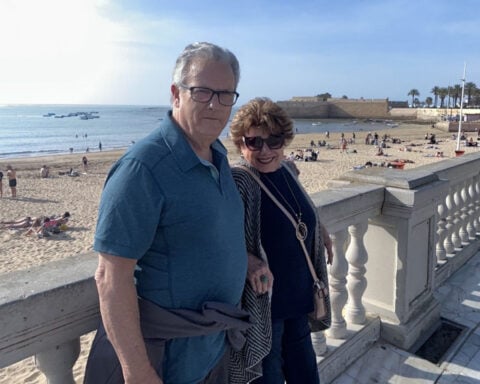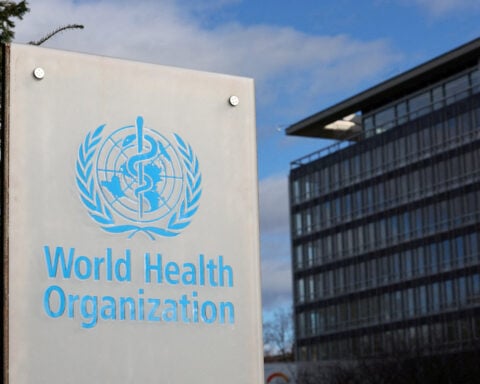At just 59 years old, talk show host Wendy Williams has been diagnosed with early-onset dementia, and because of her public battle, people are now more aware of this mental illness that can happen midlife.
Williams first found fame with her nationally syndicated "Wendy Williams Show," known for piping hot celebrity gossip. But last year, fans grew concerned as she seemed to slur her speech on air or stare blankly at cue cards. This February, through her spokesperson, Williams revealed doctors diagnosed her last summer with Frontotemporal Dementia (FTD).
FTD ravages brain parts responsible for personality, behavior, and language. What makes William's case remarkable is its premature onset. Most with FTD are diagnosed in their early 60s. Yet up to 10% of cases strike those 18 to 45. Doctors refer to these early dementias broadly as Young Onset Dementias or Early Onset Alzheimer's Disease.
After a troubling year, 59-year-old Linda Sanchez considered her memory lapses a normal part of aging. But her cognition rapidly crumbled - struggling to speak, make decisions, or recall loved ones' names. Within a year, imaging revealed an Alzheimer's diagnosis. "It was incredibly shocking," Linda's wife Anna recalls. "We never considered it could be this."
While Alzheimer's more typically develops after 65, leading organizations report between 2% to 10% of the more than 6 million Americans living with Alzheimer's have early onset cases. With growing public awareness, experts believe numbers may prove even higher. "We used to think diagnoses under age 65 were vanishingly rare," says UC San Francisco Neurologist Dr. Joel Salinas. "But now we suspect we greatly underestimated prevalence."
Estimates suggest around 60,000 Americans are currently living with early onset Alzheimer's or dementia. Thanks to research advances, doctors increasingly recognize and affirm patients' experiences. "People would say, 'but you look so young,' almost accusing me of lying," says Joy Nottingham, diagnosed with Alzheimer's at 49. "Finally getting answers was validating."
A study in JAMA Neurology notes that the annual incidence of FTD could approach 22 in 100,000 for those 45 to 64 years old. "It absolutely does happen. We see young people with this," says University of South Carolina FTD researcher Dr. Adam Boxer. "And it's really devastating."
Research confirms ethnic minorities face higher early onset dementia risk. "We see health disparities play a big role," Salinas says. UCSF researchers found African Americans were almost twice as likely as whites to develop dementia before age 65. Newer immigrant populations also saw a disproportionate impact.
Experts note early onset cases pose unique challenges. Younger patients must often still support children or manage careers while facing terminal illnesses. Limited social services also leave families struggling alone. "We suddenly had zero income, but still heaps of medical bills," Anna Sanchez recalls. "The safety nets just aren't designed for this scenario."
Friends often misunderstand or minimize Early Onset Dementia symptoms given the patient's youth. Joy Nottingham's church community doubted her diagnosis, while some friends ghosted her altogether. "People think you should just get over it and pull yourself up by the bootstraps," she says. "But the disease won't let you."
Younger dementia patients also report feeling isolated among much older support groups or long-term care residents. "I can't relate to them or participate in activities designed for 85-year-olds," says 51-year-old early onset Parkinson's patient Terri Reinhart. Specialized early onset dementia day programs and communities are beginning to emerge to meet this need.
Despite their early onset, dementias still slowly progress in younger patients as they would for older adults. "It's not necessarily a rapid descent," Boxer explains. Rather, the tragedy lies in the number of years spent living with disability ahead.
But patients still cherish the years of strength they have. "Focus on what you can do today," Nottingham encourages. "Even when so much has been taken away, there is still joy to be found." Joy savors simple moments now: laughing with her surviving family and friends or watching clouds drift by her care center window.
Early onset cases remain mysterious. Unlike familial early onset Alzheimer's, most do not inherit known genetic mutations. Researchers now look at everything from repeat head injuries to environmental triggers. "It's humbling trying to understand what goes wrong," Salinas admits. "But these patients motivate us. We owe them answers."
Progress inches forward. Researchers recently identified PET scan biomarkers allowing earlier FTD diagnosis, and clinical trials investigating new drug compounds offer hope. "We have to believe we'll get there," Boxer says. "Too many lives depend on it."
In speaking out about her Early Onset Dementia symptoms, Wendy Williams gave voice to often hidden suffering. "Her courage helps lift stigma so others understand what early onset families face," Nottingham says. "No one chooses dementia. But we can choose to walk together."
Researchers urge the public not to dismiss subtle memory issues or personality changes, even in younger adults. "Get evaluated if you notice sustained shifts," Salinas advises. Though rates are low, strides in diagnosis now offer those affected potential empowerment in their journey ahead.
"We have hard days but also happy ones," Anna Sanchez says. She looks at her wife Linda's smile lighting up seeing a favored niece. "That right there makes all the difference."
When my mother was in her 80s, her daily call to her older brother always started with the same question: "Did your bowels move today?" I used to roll my eyes and pray to the old-age gods that I would never do the same, writes a reporter for the Los Angeles Times.
Some days, the conversation would include other body functions like sleep, arthritis pain, and heart health. However, as vascular neurologist Dr. Natalia Rost points out, the question neither asked was, "How is your memory today?"
"It's just the most ironic thing that people run for their heart health or worry about their bowels when the organ that worries is our brain," said Rost, associate director of the Comprehensive Stroke Center at Massachusetts General Hospital and professor at Harvard Medical School in Boston.
"Shouldn't we be worried about the major organ in our body, the command and control center of everything that is human within us? There is no us without our brains," said Rost, president-elect of the American Academy of Neurology (AAN).
Get ready to focus on your brain because, according to the AAN, the era of preventive neurology has arrived. In fact, the academy is hoping that all Americans will be on the healthy brain train by 2050. "It's a brain health revolution," Rost said. "We want to help the public understand that a lifetime of health begins with brain health."
The academy's vision is that one day, within the next 25 years, you, your children, and your grandchildren will visit the doctor for yearly "well-brain" checkups that are covered by insurance as preventive care. In fact, that first visit may occur before a child is even conceived.
"We want major insurance payers to cover a well-brain visit as early as when Mom is considering pregnancy or is pregnant," Rost said. "Then when the baby is born, we bring in pediatric neonatologists, and then we follow the child into adolescence using all we are learning about the optimization of brain function."
Interventions might include:
- Encouraging moms-to-be to breastfeed as long as possible.
- Limiting a child's exposure to screens.
- Improving sleep habits can carry on into adulthood, among many others.
As a person ages, each well-brain exam would focus on early prevention of diseases known to damage the brain, such as diabetes, obesity, heart disease, and more. Those visits would continue "into end-of-life stages because even as we age or acquire a cognitive disease, we can still optimize brain health while living with brain disorders," Rost said.
What might you experience during a brain checkup in the future? To find out, the reporter details a deep dive inside one state-of-the-art brain examination that exists today at the Institute for Neurodegenerative Diseases of Florida.
There, preventive neurologist Dr. Richard Isaacson opened one of the first Alzheimer's prevention clinics in the United States at Weill Cornell Medicine and New York-Presbyterian in New York City back in 2013.
Now, his new program in Florida aims to be on the cutting edge of understanding cognitive health.
The reporter signed up to be participant No. 20 in a clinical trial focused on nurturing the aging brain. The study would determine genetic, behavioral, and lifestyle risks for decline, provide personalized improvement plans, and track progress via experimental blood tests.
These distinctive blood tests have the potential to identify levels of amyloid, tau, and other key biomarkers associated with Alzheimer's disease and other degenerative illnesses. Accumulations of amyloid can initiate in the brain many years before symptoms manifest, possibly even in an individual's 30s and 40s.
Isaacson stated that more than 46 million Americans are today believed to have pre-symptomatic Alzheimer's disease, with pathological signs of the illness detectable in the blood and brain before the onset of cognitive impairment.
The reporter engaged in a series of physical and cognitive assessments to create a foundational brain profile for participation. Initially, blood samples were collected and dispatched to a laboratory in Boston for analysis to assess both beneficial and harmful cholesterol levels, inflammation, insulin resistance, and nutritional condition. These characteristics are crucial indicators of the risk of cardiovascular disease and stroke.
"Vascular risk factors like high blood pressure, high cholesterol, high blood sugar, or diabetes may not directly cause Alzheimer's disease, but they have the potential to accelerate the progression of Alzheimer's pathology," Isaacson clarified. Opting to hit the brakes instead of accelerating toward cognitive degeneration is my preferred choice.
Another key question: Did the reporter have the APOE4 gene variant that raises Alzheimer's risk? Next, a body scan checked for thinning bones, low muscle mass, and fat accumulation around the waistline - all linked to cognitive problems.
A vision test determined any issues impacting cognition while examining retinal blood vessels and checked for early signs of diabetes, hypertension, or coronary artery disease.
Then came a baseline series of memory and cognitive tests. Could the reporter remember a list of 15 words immediately after hearing them? Draw complex geometric designs from memory? Identify faces and names just introduced?
"It's humbling trying to understand what goes wrong," Salinas admits about dementia's mysteries. "But these patients motivate us. We owe them answers."
"We have to believe we'll get there," Boxer says about progress inching forward. "Too many lives depend on it."
The reporter's risks proved pretty low so far, though some blood markers for vascular dementia were borderline high. To improve those, Isaacson suggested cutting out foods that spike blood sugar according to glucose monitoring. "Such spikes cause brain inflammation, disrupt brain metabolism, and increase shrinkage of the thinking part of the brain," he warned.
The pandemic also took a toll, decreasing muscle mass and aerobic conditioning while increasing waistline fat and blood pressure. Following specific diet and exercise recommendations could help turn this around.
While well-brain preventative visits may be a ways off for most people, Isaacson believes using technology like cell phones could expand access. He helps lead an NIH study called Retain Your Brain that provides free risk assessments and advice remotely.
"These types of digital brain health resources could potentially be used until the field of preventive neurology develops more broadly," Isaacson said.
Early onset dementia remains a mysterious and tragic illness, robbing individuals of cognitive abilities and independence often decades too soon. Yet the courage of public figures like Wendy Williams, along with the resilience of patients like Joy Nottingham, continues to break the stigma and bring this silent suffering into the light. Researchers make progress daily, fuelled by the stories of those affected, while clinicians urge us not to accept cognitive decline as an inevitable part of aging. Subtle shifts in memory or behavior should spark proactive concern, though specialized care continues to be limited. "We have hard days, but also happy ones," caregiver Anna Sanchez acknowledges, embracing fleeting yet precious moments of connection. Ultimately, consistent funding and enrollment in clinical trials offer the best hope for uncovering answers that could drastically shift the trajectories of early onset dementia families. Though the way ahead lies long, the strength found in speaking out and walking together has already begun to pave the path.

 Trump has begun another trade war. Here's a timeline of how we got here
Trump has begun another trade war. Here's a timeline of how we got here
 Canada's leader laments lost friendship with US in town that sheltered stranded Americans after 9/11
Canada's leader laments lost friendship with US in town that sheltered stranded Americans after 9/11
 Chinese EV giant BYD's fourth-quarter profit leaps 73%
Chinese EV giant BYD's fourth-quarter profit leaps 73%
 You're an American in another land? Prepare to talk about the why and how of Trump 2.0
You're an American in another land? Prepare to talk about the why and how of Trump 2.0
 Chalk talk: Star power, top teams and No. 5 seeds headline the women's March Madness Sweet 16
Chalk talk: Star power, top teams and No. 5 seeds headline the women's March Madness Sweet 16
 Purdue returns to Sweet 16 with 76-62 win over McNeese in March Madness
Purdue returns to Sweet 16 with 76-62 win over McNeese in March Madness








